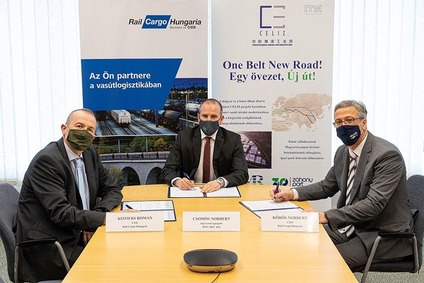
László Mosóczi, State Secretary for Transport of the Ministry of Innovation and Technology (ITM) and Róbert Homolya, President-CEO of MÁV attended the event online.
On behalf of CELIZ in the representation of the consortium leader MÁV-REC Kft. Norbert Csomós managing director and on behalf of RCH Norbert Körös CEO and Román Kotiers CFO, Members of the Board signed the document. László Horváth, President-CEO of L.A.C. Holding Zrt. and majority owner of MÁC-REC Kft. and Imre Kovács, Chairman of the Board of Rail Cargo Hungaria and Member of the Board of the Rail Cargo Group joined the event online and recognized the importance of signing the agreement.
The managers of the two companies agree that the volume of rail freight between China and Europe will increase significantly over the next decade. The Chinese industry has reached a state of development that enables the export of capacities as production lines and production technologies. The Far Eastern country is increasingly trying to strengthen its ability to become a high-tech superpower by exporting quality products and by the acknowledgement of Chinese standards. With the development of the logistics corridors of the Silk Road Economic Belt less developed Chinese western and southwestern areas are connected to transcontinental traffic. The Hungarian national economy can benefit from all this in case the large-scale development of the transhipment infrastructure in Záhony will be realised. The availability of the capacity required for the arrival and logistics of Chinese goods in Europe plays a decisive role in ensuring that the extraordinary quantities of shipments coming from the Far East reach the markets of the European Union partly through a transport route via Hungary.
The speakers expressed that handling part of the increasing trade between China and Europe via the Mediterranean rail freight corridor, RFC 6, with the participation of Hungary is a national economic interest. This will directly increase the incomes generated by rail freight transport and also the related tax, customs and other logistics revenues. Another important factor is that the increasing volume of rail freight contributes to reducing the ecological footprint of freight transport.
Simultaneously with the signing of the Memorandum of Understanding, the two companies decided to further review their future cooperation opportunities, stating that in case of a positive result, they will conclude a cooperation agreement by 15 April 2021.
Róbert Homolya, President-CEO of MÁV Zrt. emphasized in his online speech that in the framework of the European Green Deal the European Union aims to reduce CO2-emissions arising from freight transport by 90% until 2050. In order to achieve this goal until 2030 30% and until 2050 50% of the transit road transport has to be shifted to a more eco-friendly solution, mostly to rail. As the parent company of the CELIZ consortium member Záhony-Port and the operator of the nation-wide infrastructure network the more efficient handling and further increasing of the extended intermodal traffic from the Far-East via Záhony, and the utilization of the opportunities arising from the New Silk Road geopolitical strategy is also in MÁV’s interest. With the developments, Záhony becomes even more suitable for this.
László Mosóczi, State Secretary for Transport participated online as well and stated that the Hungarian transport development efforts will focus on rail in the next decade. Railborne traffic investments totalling HUF 6,000 billion are expected: the government plans to allocate HUF 4000 billion for modernising the infrastructure and HUF 2000 billion for renewing the rolling stock. An important aim of the Hungarian railway programme is that Hungary becomes the freight transport, logistics and distributional centre of Middle-Europe. In order to facilitate rail freight transport, the government decided at the end of 2020 to prepare the V0 rail freight line, which bypasses Budapest from the south. The associated public procurement can already begin in March of this year, and the acquisition of the environmental protection permit is expected in spring 2023.
